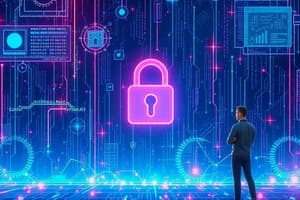Podcast
Questions and Answers
What are identity thieves known for?
What are identity thieves known for?
- Obtaining unauthorized access to personal information (correct)
- Stealing unsecured Wi-Fi connections
- Hacking into computer systems
- Creating malware programs
Which of the following is a form of malware?
Which of the following is a form of malware?
- Phishing
- Virus (correct)
- Firewall
- Social Engineering
Phishing only occurs through emails.
Phishing only occurs through emails.
False (B)
What is a top action to protect passwords?
What is a top action to protect passwords?
What should you do to prevent identity theft?
What should you do to prevent identity theft?
Provide one tip to avoid phishing scams.
Provide one tip to avoid phishing scams.
Phishing can steal personal information by tricking you into ________.
Phishing can steal personal information by tricking you into ________.
Match the following cybersecurity actions with their purposes:
Match the following cybersecurity actions with their purposes:
Flashcards are hidden until you start studying
Study Notes
Cybersecurity Threats
- Identity Thieves - Obtain unauthorized access to personal information such as FSUID, SSN, bank accounts and passwords to commit fraud or theft.
- Hackers - Secretly access computer systems to steal information or cause damage.
- Malware - Malicious software including computer viruses, worms, Trojans and spyware that harms a computer user.
- Phishing - Steals personal information by tricking users into clicking a link or entering their username and password through emails, phone calls, and website downloads.
Cybersecurity Actions
-
Protect Passwords
- Never share passwords with anyone.
- Create strong passwords that are difficult to guess, avoid dictionary words and common passwords.
- Change passwords periodically.
- Use at least 8 characters with a mix of uppercase and lowercase letters, numbers, and symbols.
- Use mnemonics to remember complex passwords.
- Use different passwords for different sites.
- Store passwords in a safe place.
- Avoid keeping passwords on sticky notes.
- Consider password vaults like LastPass or KeePass.
-
Prevent Identity Theft
- Do not share Social Security numbers, driver's license numbers, bank account numbers or other personal information unless you know who you are providing it to.
- Protect other people's information as you would your own.
- Never send personal or confidential information via email, text message, or instant message.
-
Beware of Phishing
- Phishing attacks trick users into clicking links or entering credentials.
- Phishing comes in many forms including emails, phone calls, and website downloads.
- Phishing attempts may look like they are from Florida State University (IT Services or the Service Desk).
- FSU will never ask for your FSUID username and password in an email or phone call.
-
Tips to Avoid Phishing Scams
- Be skeptical of messages requiring “immediate action” or threatening loss.
- Type website addresses in the browser to access sites directly instead of clicking links.
- Hover over links to display the true URL and see if it's a reputable website.
- Think before clicking email and website links and never click links that you don't trust.
- Do not open unexpected attachments, especially ZIP files, and never run .exe files.
- Avoid providing personal information over the phone from unsolicited calls.
- Never send credit card or other sensitive information via email.
- Use common sense; if it looks like spam, it probably is.
Studying That Suits You
Use AI to generate personalized quizzes and flashcards to suit your learning preferences.




